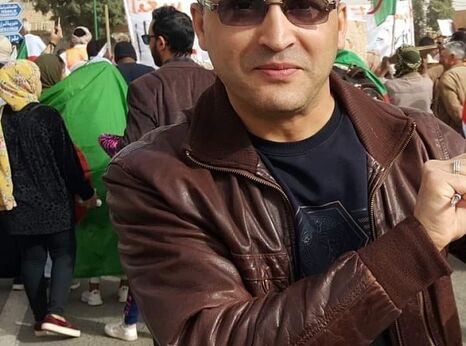Journalist arrested for covering a protest

Rabah Kareche has been a correspondent for Liberté newspaper in Tamanrasset for almost a decade. His publications in Liberté cover a range of issues including social justice, governance, corruption, and migration. His coverage of events in Algeria’s most southern region and military zone brought attention to the struggle of the Tuareg populations who regularly protest against their economic and social marginalization without enough media attention. Rabah Kareche exposed this issue including through interviewing a tribal leader of the district of Tazrouk, in the province of Tamanrasset, who accused the authorities of not having taken into account a report on the historical territorial limits of the province when deciding to establish new territorial division in the region.
Rabah Kareche’s detention is an example of the Algerian authorities’ renewed crackdown on human rights, particularly the rights to freedom of expression, peaceful assembly and media freedom in the country. In February 2021, President Tebboune pardoned dozens of activists who had spent months in prison for nothing other than peacefully participating in the popular Hirak protest movement- which demands political change in Algeria- . Among those released was journalist Khaled Drareni who had spent almost a year behind bars simply for covering the Hirak protests. Since the Hirak protests resumed in February 2021 after months of rupture, due to COVID-19 restrictions, the Algerian authorities resumed repressive tactics by targeting journalists, human rights defenders, activists, and protesters through arbitrary arrests and various other means that limit their rights to peaceful expression and assembly. According to the National Committee for the liberation of detainees, a local watchdog group, at least 63 activists are currently in detention in Algeria, with 48 arrested since February 2021.
Algerian legislation is rife with repressive provisions that enable the prosecution of journalists, bloggers and activists. These laws are often vaguely worded and overly broad, allowing them to be applied arbitrarily against people criticizing the authorities. In a report published on 22 February 2021, Amnesty International found that courts relied on at least 20 such articles, with the most commonly used being "harming national unity", "harming national interest", "demoralizing the army", "incitement to unarmed gathering", "offending public officials", "offending the President" or "harming Islam", under Penal Code Articles 79, 96, 74, 75, 100, 144, 144 bis, and 144 bis 1 respectively. The authorities used the COVID-19 pandemic as excuse to pass new laws which further curtail the rights to freedom of expression, online and offline, and peaceful assembly, by adding article 196 bis to the Penal Code to punish the spread of “fake news”.
As a state party to the International Covenant on Civil and Political Rights (ICCPR)- which in its Article 19 guarantees everyone’s right to hold opinions without interference and to seek, receive and impart information and ideas of all kinds, regardless of frontiers and through any media- Algeria is obligated to respect, protect, promote and fulfil the right to freedom of expression and media freedom.